Topics
- Page Path
-
- HOME
- TOPICS
- Topics
- Topics
-
- Adolescence Medicine (3)
- Allergy (53)
- Cardiology (76)
- Critical Care Medicine (8)
- Developmental and Behavioral Medicine (19)
- Emergency Medicine (5)
- Endocrinology (53)
- Gastroenterology (57)
- General Pediatrics (38)
- Genetics and Metabolism (22)
- Hematology (12)
- Immunology (12)
- Infection (66)
- Neonatology (Perinatology) (108)
- Nephrology (Genitourinary) (49)
- Neurology (88)
- Nutrition (26)
- Oncology (15)
- Neurobehavior (12)
- Pulmonology (26)
- Rheumatology (2)
- Other (30)
- Original Article
- Neonatology (Perinatology)
- Mediation effect of cord blood cortisol levels between maternal prepregnancy body mass index and birth weight: a hospital-based cross-sectional study
- Nisanth Selvam, Jayashree K, Prasanna Mithra
- Clin Exp Pediatr. 2022;65(10):500-506. Published online July 29, 2022
-
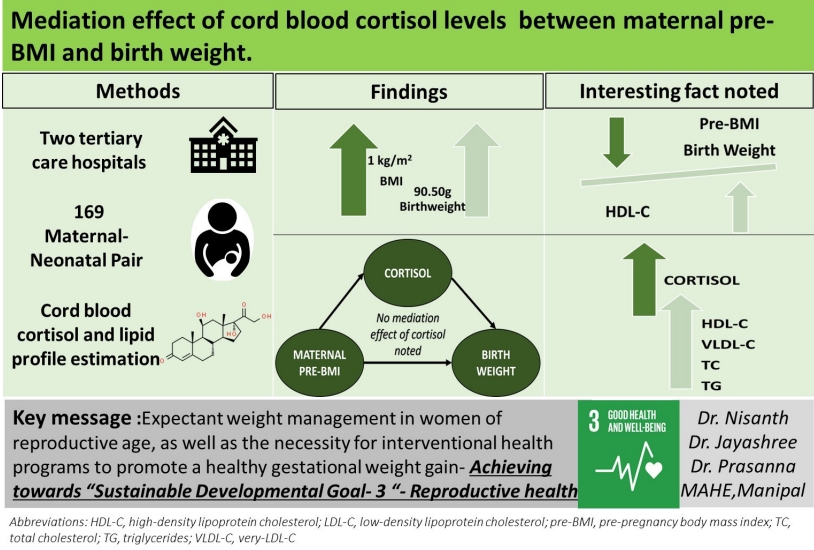
Question: What is the association between cord blood cortisol and maternal weight, birth weight, and cord blood lipid profile?
Finding: Cord blood cortisol levels did not influence the relationship between maternal weight changes or birth weight. Maternal weight changes, birth weight, and cortisol levels altered the cord blood lipid profile.
Meaning: Our findings may aid United Nations Sustainable Development Goal 3 (Good Health and Well-Being) achievement by 2030.
- Editorial
- Neurobehavior
- Impact of coronavirus disease 2019 on children’s health
- Joon Won Kang
- Clin Exp Pediatr. 2022;65(10):498-499. Published online September 16, 2022
-

· Coronavirus disease 2019 (COVID-19) has had an enormous impact on mental health and other aspects of children’s health.
· The prevalence of anxiety, depression, and posttraumatic stress disorder in children and adolescents have increased in the COVID-19 era.
· Cooperation among parents, guardians, academic societies, and the government is needed to maintain the mental health of children and adolescents.
- Other
- Three-dimensional printing technolgy in orthopedic oncology
- Yongsung Kim
- Clin Exp Pediatr. 2022;65(10):496-497. Published online May 11, 2022
-
Orthopedic oncology is one of the most active fields in applying 3-dimensional printing technology from preoperative planning to intraoperative procedures such as accurate resection of tumors and reconstruction of huge bone defects.
- Nephrology (Genitourinary)
- Hypertension in adulthood is programmed during the perinatal period
- Min Hyun Cho
- Clin Exp Pediatr. 2022;65(10):494-495. Published online August 12, 2022
-
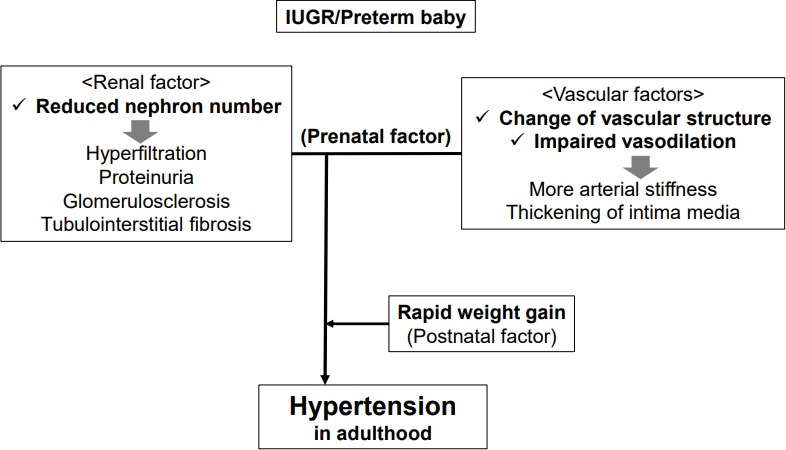
∙ Intrauterine growth restriction (IUGR) and preterm birth can be significant risk factors for the development of adult hypertension.
∙ Several perinatal factors of hypertension are related to IUGR, including renal, vascular, and rapid catch-up growth.
- Review Article
- Neurology
- Rotavirus infection-associated central nervous system complications: clinicoradiological features and potential mechanisms
- Kyung Yeon Lee
- Clin Exp Pediatr. 2022;65(10):483-493. Published online February 7, 2022
-

∙ Rotavirus infection-associated central nervous system (CNS) complications are fairly common in children.
∙ Common clinicoradiological features include benign convulsions with mild gastroenteritis, acute encephalopathies/encephalitis, cerebellitis, and neonatal rotavirus-associated leukoencephalopathy.
∙ Possible mechanisms for CNS complications include direct viral invasion into the brain via several potential routes such as the blood-brain barrier and vagus nerve, and entry of various brain-damaging mediators and activated immune cells into the brain.
- Oncology
- Application of 3-dimensional printing implants for bone tumors
- Jong Woong Park, Hyun Guy Kang
- Clin Exp Pediatr. 2022;65(10):476-482. Published online December 23, 2021
-

∙ The application of 3-dimensional (3D) printing in orthopedic oncology is summarized into bone and tumor modeling, patient-specific instruments (PSIs), custom-made implants, and tissue engineering.
∙ The 3D-printed customized implant is the most central application, while modeling and PSI often play adjunct roles.
∙ Short-term surgical outcomes of custom-made 3D-printed implants are promising.
- Neurology
- Update on benign convulsions with mild gastroenteritis
- Yeong Seok Lee, Ga Hee Lee, Young Se Kwon
- Clin Exp Pediatr. 2022;65(10):469-475. Published online December 27, 2021
-

∙ The main pathogen for benign convulsions with mild gastroenteritis (CwG) was previously rotavirus; however, cases associated with norovirus are increasing.
∙ CwG is characterized by clustered generalized seizures. Electroencephalography and magnetic resonance imaging show transiently abnormal findings in the acute phase that eventually normalize with progression. Its prognosis is good, and long-term treatment is unnecessary.
∙ There are many reports on the pathophysiological mechanism of CwG, which remains unclear.
- Letter to the Editor
- Developmental and Behavioral Medicine
- The influence of parental eating behaviors, child-feeding practices, and infants’ temperaments upon infants’ eating behaviors
- Goh Woon Lim, Kyoung Min Shin
- Clin Exp Pediatr. 2022;65(9):466-468. Published online June 27, 2022
-
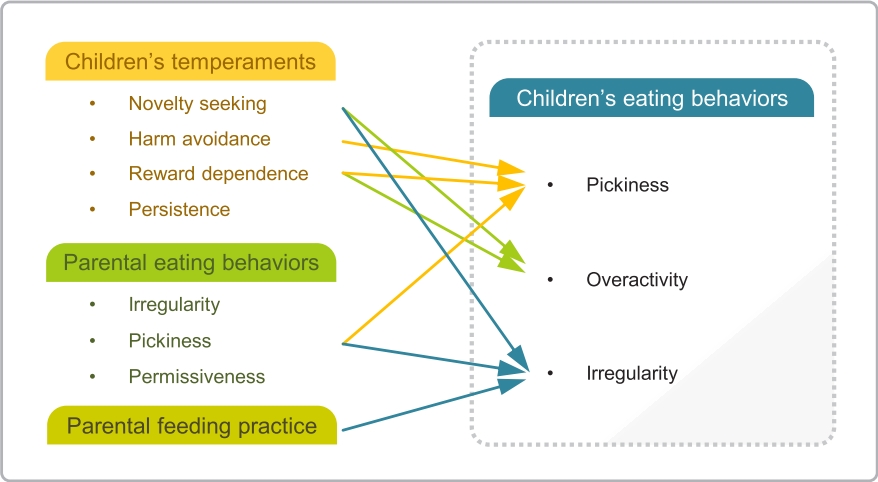
- Original Article
- Other
- Plastic bottle feeding produces changes in biochemical parameters in human infants – A pilot study
- Mahendra K. Pant, Abul. H. Ahmad, Manisha Naithani, Jayanti Pant
- Clin Exp Pediatr. 2022;65(9):459-465. Published online May 19, 2022
-
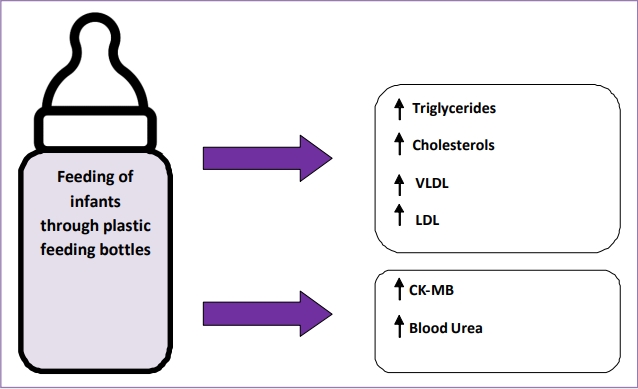
Question: Plastic feeding bottles are used commonly to feed infants who cannot be breastfeed. Does plastic bottle feeding produce biochemical changes in infants?
Finding: The plastic bottles leach out endocrine disruptors and affects bodily functions in terms of biochemical alterations like increased blood urea, raised creatine-kinase–MB levels, and altered lipid profile in infants exposed to bottle feeding.
Meaning: Plastic bottles feeding alters bodily functions in infants.
- Oncology
- Treatment outcomes of high-dose chemotherapy plus stem cell rescue in high-risk neuroblastoma patients in Thailand
- Kunanya Suwannaying, Piti Techavichit, Patcharee Komvilaisak, Napat Laoaroon, Nattee Narkbunnam, Kleebsabai Sanpakit, Kanhatai Chiengthong, Thirachit Chotsampancharoen, Lalita Sathitsamitphong, Chalongpon Santong, Panya Seksarn, Suradej Hongeng, Surapon Wiangnon
- Clin Exp Pediatr. 2022;65(9):453-458. Published online May 24, 2022
-

Question: This study aimed to elucidate the outcomes of high-risk neuroblastoma (HR-NB) patients treated with high-dose chemotherapy and stem cell rescue without immunotherapy.
Finding: The 5-year overall survival and event-free survival rates were 45.1% and 40.4%, respectively.
Meaning: High-dose chemotherapy plus stem cell rescue followed by cis-retinoic acid for 12 months is well tolerated and could improve survival in patients with HR-NB in limited resource settings.
- Editorial
- Endocrinology
- Bisphenol A leaching from polycarbonate baby bottles into baby food causes potential health issues
- Ga Won Jeon
- Clin Exp Pediatr. 2022;65(9):450-452. Published online July 25, 2022
-
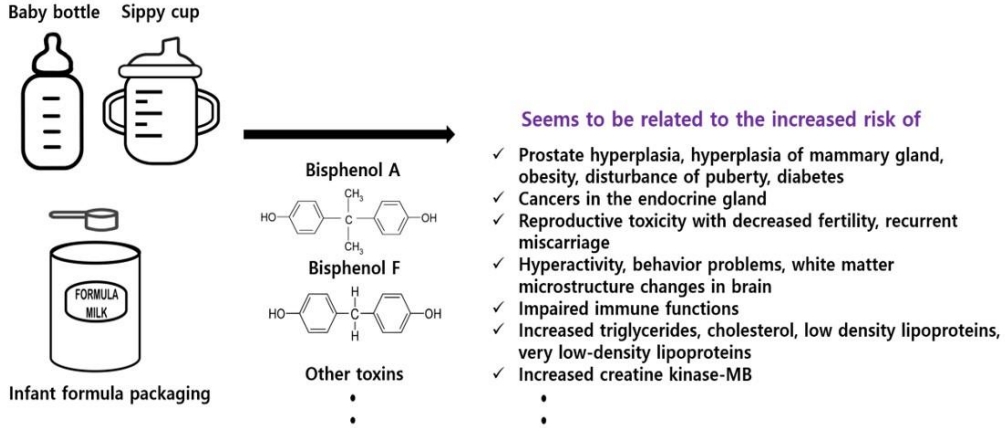
Can bisphenol A (BPA) leach out from polycarbonate baby bottles into baby food? BPA and other toxic materials can leach out from baby bottles and increase the risk of various health problems, including endocrine disturbances. Although the use of BPA in baby bottles has been banned, many developing countries still use it, which can cause health issues. Thus, public awareness of this issue is required.
- Cardiology
- Characteristics of z score systems for diagnosing coronary abnormalities in Kawasaki disease
- Gyeong-Hee Yoo
- Clin Exp Pediatr. 2022;65(9):448-449. Published online March 14, 2022
-

Because of the various body sizes of children with Kawasaki disease (KD), coronary artery diameter requires normalization to the body surface area as a z score.
In updated guidelines, coronary artery abnormalities are important criteria in the diagnosis of KD, and z score systems have been accepted to define coronary artery abnormalities.
However, the z score formula should be selected carefully because each yields different results.
- Review Article
- Gastroenterology
- Factors influencing development of the infant microbiota: from prenatal period to early infancy
- Sujin Jeong
- Clin Exp Pediatr. 2022;65(9):439-447. Published online December 23, 2021
-
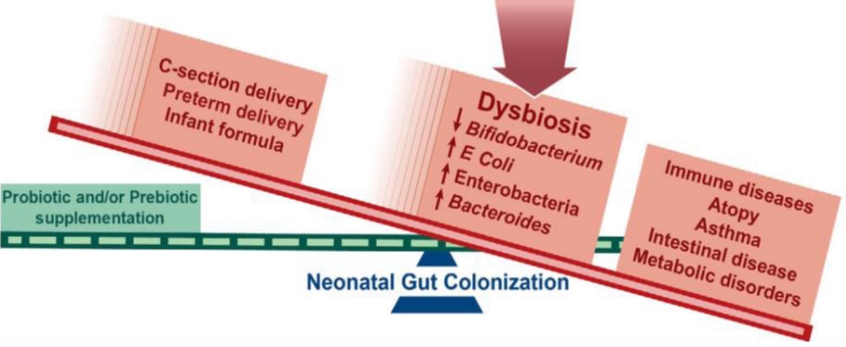
∙ Microbial colonization primarily occurs after birth but there may be some colonization in utero, although this remains highly controversial.
∙ Maternal factors during pregnancy affect the infant microbiota: diet, weight, gestational weight gain, and antibiotic usage.
∙ Microbes are passed from mother-to-infant during and after birth. Delivery mode, breastfeeding, early life antibiotic, and proton pump inhibitor treatment have the largest effects on microbial composition in early life.
∙ The early life gut microbiome plays an important role in the development of the immune system and metabolism.
- Cardiology
- Diagnosis of coronary artery abnormalities in Kawasaki disease: recent guidelines and z score systems
- Sung Hye Kim
- Clin Exp Pediatr. 2022;65(9):430-438. Published online December 17, 2021
-
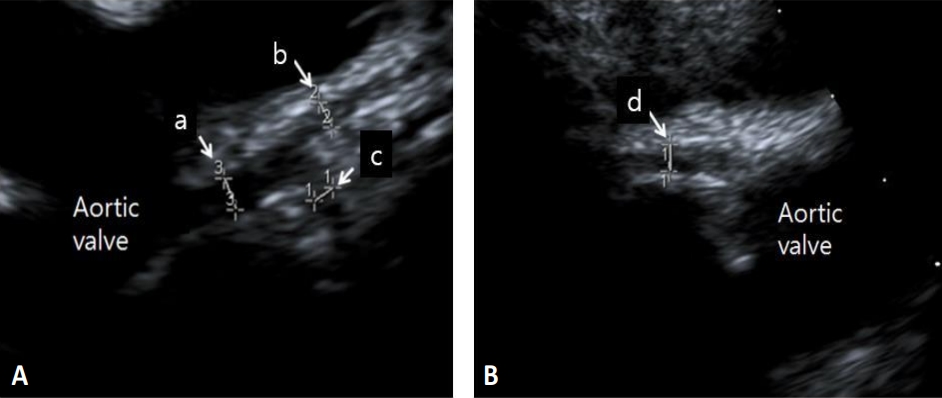
∙ Kawasaki disease is the leading cause of acquired heart disease among children in the developed countries, and Korea has the second-highest incidence in the world.
∙ Early diagnosis and proper treatment are imperative to prevent coronary complication, and evaluation of coronary artery abnormalities is fundamental.
∙ Recent guidelines have adapted z score system for the diagnosis of coronary artery abnormalities in Kawasaki disease.
∙ Applying z score in diagnosis of coronary abnormalities has better correlation with clinical outcomes than absolute cutoff values.
∙ Calculated z scores could be different according to the z score formula, which might influence the treatment plan.
- Neonatology (Perinatology)
- Breastfeeding and vitamin D
- Ju Sun Heo, Young Min Ahn, Ai-Rhan Ellen Kim, Son Moon Shin; for the Korean Society of Breastfeeding Medicine
- Clin Exp Pediatr. 2022;65(9):418-429. Published online December 14, 2021
-
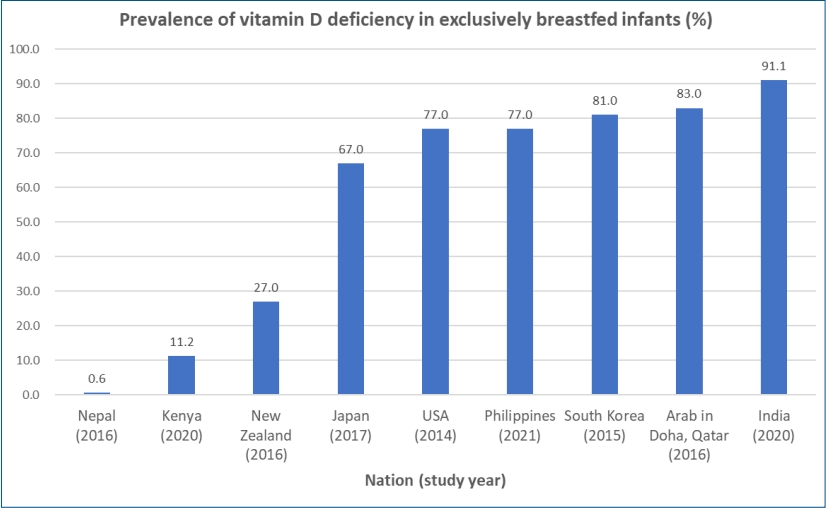
∙ Exclusively breastfed infants are at risk of developing vitamin D deficiency associated with hypocalcemia, rickets, and various health outcomes.
∙ The prevalence of vitamin D deficiency in breastfed infants differs vastly between studies and nations at 0.6%–91.1%.
∙ The vitamin D content of breast milk does not meet the requirements of exclusively breastfed infants.
∙ Most international guidelines recommend that breastfed infants be supplemented with 400 IU/day of vitamin D during the first year of life.
∙ Vitamin D intake (milk+supplements) of 800 IU/day can be considered in preterm infants along with biochemical monitoring.
- Retraction Notice
- Coronavirus disease 2019 in a 2-month-old male infant: a case report from Iran
- Hosein Heydari, Seyed Kamal Eshagh Hossaini, Ahmad Hormati, Mahboubeh Afifian, Sajjad Ahmadpour
- Clin Exp Pediatr. 2022;65(8):417-417. Published online July 19, 2022
-
- Original Article
- Cardiology
- Early myocardial functional abnormalities in primary dyslipidemia: clinical and echocardiographic observations in young children from a highly consanguineous population
- Nehal M. El-koofy, Aya M. Fattouh, Areef Ramadan, Mohamed A. Elmonem, Dina H. Hamed
- Clin Exp Pediatr. 2022;65(8):410-416. Published online December 8, 2021
-
In children with primary dyslipidemia, functional myocardial abnormalities can occur at young age, including diastolic functional impairment of both ventricles and narrowing of the aortic valve and the sinus of Valsalva. Echocardiographic evaluations of high-risk children may be as important as biochemical evaluations.
- Hematology
- Effect of cyclic pamidronate administration on osteoporosis in children with β-thalassemia major: a single-center study
- Mahmoud A. El-Hawy, Nagwan Y. Saleh
- Clin Exp Pediatr. 2022;65(8):405-409. Published online June 7, 2022
-
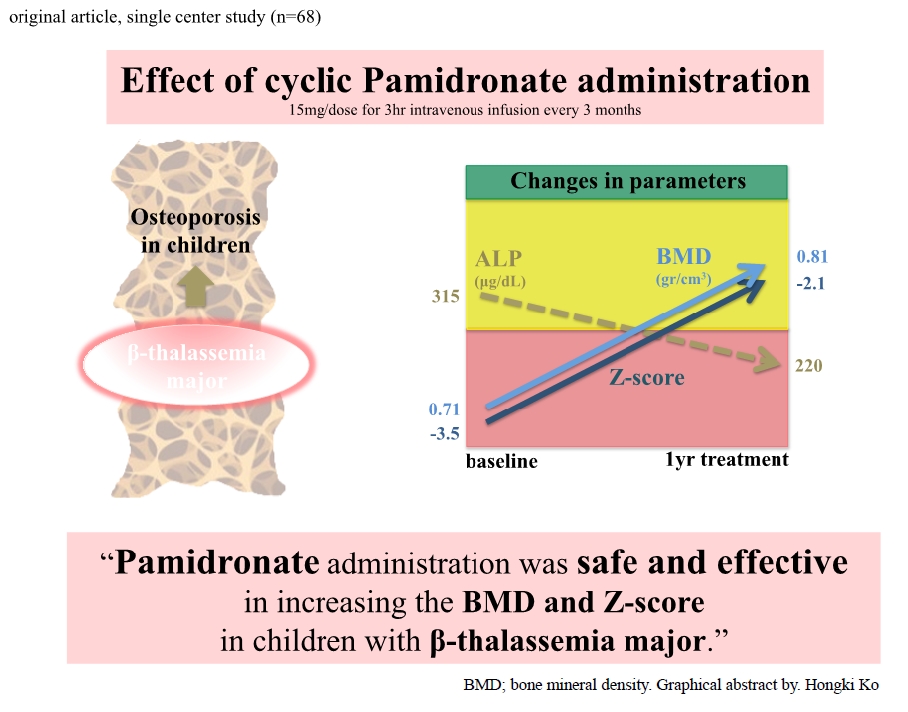
Question: What is the effect of cyclic pamidronate administration on osteoporosis in children with β-thalassemia major?
Finding: The dual-energy x-ray absorptiometry scan findings of children with β-thalassemia major and osteoporosis were improved after pamidronate administration.
Meaning: Cyclic pamidronate effectively treated osteoporosis in children with β-thalassemia major.
- Editorial
- Neonatology (Perinatology)
- Factors to consider before implementing telemedicine protocols to manage neonatal jaundice
- Heui Seung Jo
- Clin Exp Pediatr. 2022;65(8):403-404. Published online April 12, 2022
-
In the rapidly changing environmental situation during the coronavirus disease 2019 outbreak, neonatal centers have developed telemedicine systems with extended coverage for neonatal monitoring and high-risk follow-up programs including neonatal hyperbilirubinemia. At this point, electronic health technology and noncontact medical system increase the effectiveness of rather than replacing the face-to-face visit and the opinions of experienced neonatologists.
- Pulmonology
- Now lung ultrasound has been established as a fundamental examination in pediatric respiratory diseases
- Kyunghoon Kim
- Clin Exp Pediatr. 2022;65(8):401-402. Published online July 13, 2022
-
· Several studies demonstrated the usefulness of lung ultrasound in pediatric respiratory diseases including coronavirus disease 2019.
· Knowledge of lung ultrasound is increasing, and lung ultrasound has been established as a fundamental diagnostic examination for pediatric respiratory diseases.
- Cardiology
- Early echocardiographic screening for subclinical myocardial dysfunction in children and adolescents with dyslipidemia: why and when?
- Hyun Gyung Lee, Hwa Jin Cho
- Clin Exp Pediatr. 2022;65(8):398-400. Published online March 7, 2022
-

Dyslipidemia contributes to early atherosclerosis, premature cardiovascular disease, and subclinical ventricular dysfunction in children. This paper highlights the need for echocardiographic evaluation for impaired diastolic function of both ventricles and narrowing of the aortic valve and sinus of Valsalva. Therefore, early echocardiographic screening of children with primary hyperlipidemia should be considered.
- Review Article
- Neurology
- Neonatal seizures: diagnostic updates based on new definition and classification
- Eun-Hee Kim, Jeongmin Shin, Byoung Kook Lee
- Clin Exp Pediatr. 2022;65(8):387-397. Published online April 4, 2022
-
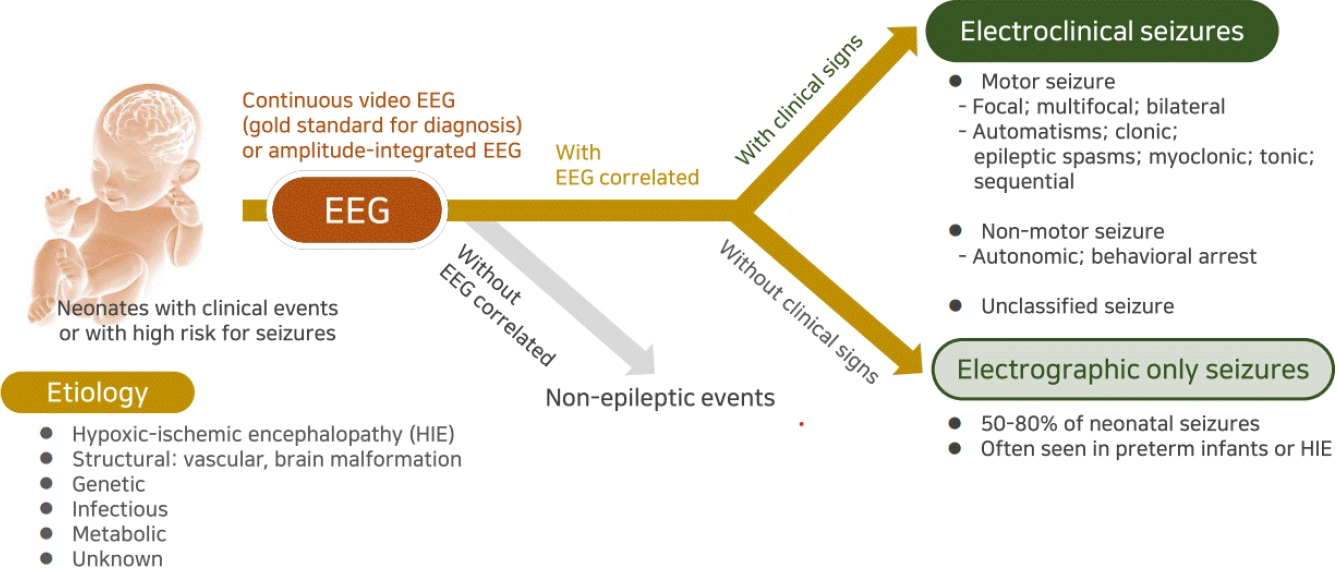
· Neonatal seizures are often electrographic-only seizures without clinical signs; therefore, the identification of electrical seizure activity on electroencephalography is the gold standard for diagnosis.
· Clinical signs of neonatal seizures are divided into motor or nonmotor seizures, and motor seizures are mostly focal or multifocal.
· Most neonatal seizures are caused by acute symptomatic etiologies, but in cases of intractable seizures, structural, genetic, or metabolic etiologies should be investigated.
- Infection
- Therapeutics for the treatment of coronavirus disease 2019 in children and adolescents
- Soo-Han Choi, Jae Hong Choi, Ki Wook Yun
- Clin Exp Pediatr. 2022;65(8):377-386. Published online June 27, 2022
-
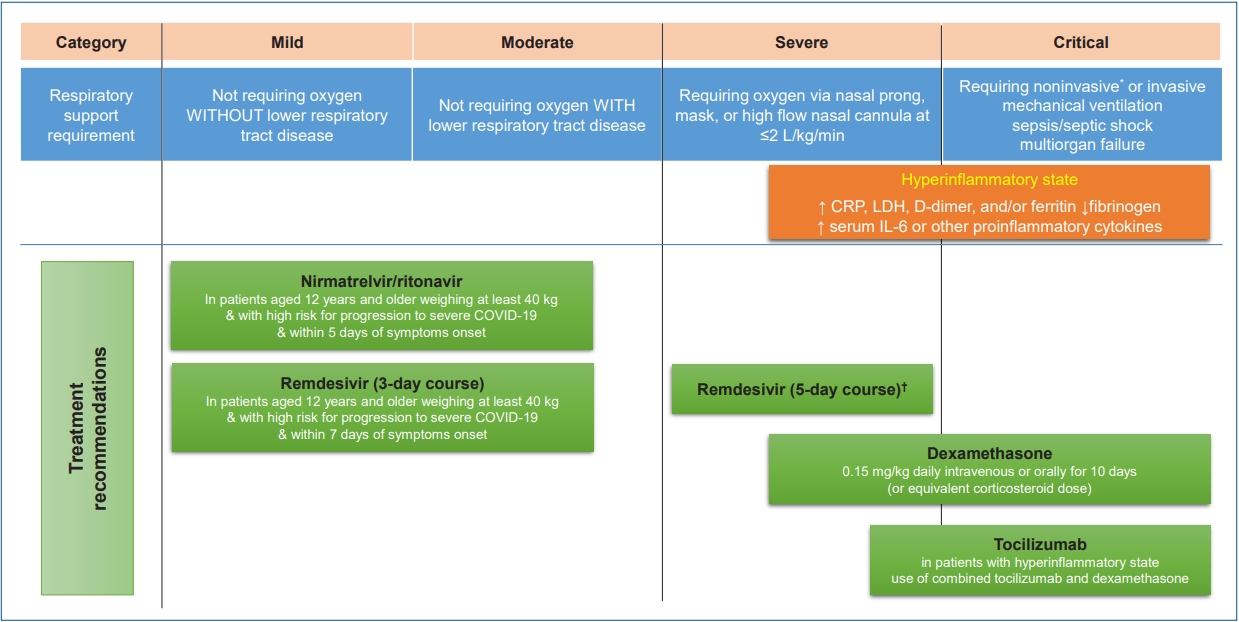
· Children and adolescents with high risks for severe coronavirus disease 2019 (COVID-19) should be identified and proper treatment should be provided promptly according to the patient’s condition.
· Remdesivir can be considered for pediatric patients of all ages with COVID-19 who have an emergent or increase in supplemental oxygen.
· The use of corticosteroids is not recommended for patients with nonsevere COVID-19. Corticosteroids are recommended in children and adolescents with severe and critical COVID-19.
- Nephrology (Genitourinary)
- Neonatal hypertension: concerns within and beyond the neonatal intensive care unit
- Kathleen Altemose, Janis M. Dionne
- Clin Exp Pediatr. 2022;65(8):367-376. Published online May 30, 2022
-

Some neonates, especially those who are premature, may experience hypertension while in the neonatal intensive care unit (NICU). The most common causes are prematurity-related and the hypertension usually resolves over the first 1–2 years of life. Unfortunately, the increasing population of NICU graduates is at risk for later cardiovascular and kidney disease in childhood and adulthood. This population requires careful attention to blood pressure and weight throughout their life course.
- Original Article
- Infection
- Role of lung ultrasound patterns in monitoring coronavirus disease 2019 pneumonia and acute respiratory distress syndrome in children
- Satyabrata Roychowdhoury, Subhajit Bhakta, Manas Kumar Mahapatra, Saptarshi Ghosh, Sayantika Saha, Mithun Chandra Konar, Mihir Sarkar, Mousumi Nandi
- Clin Exp Pediatr. 2022;65(7):358-366. Published online May 13, 2022
-
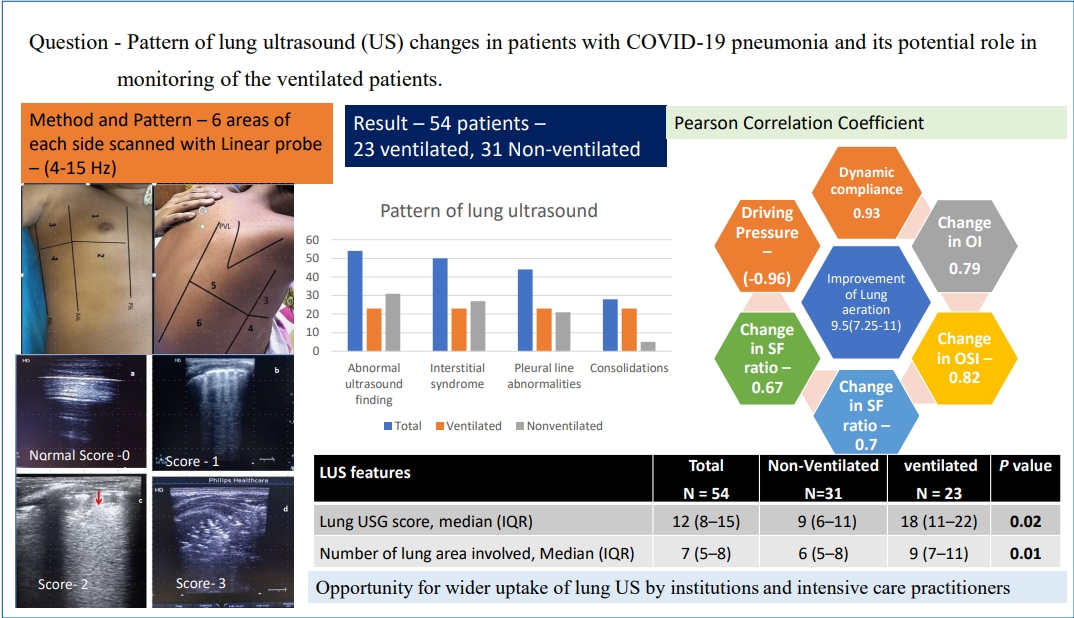
Question: Potential role of patterns of lung ultrasonography (US) in monitoring changes in mechanically ventilated patients with coronavirus disease 2019 (COVID-19) pneumonia.
Finding: Interstitial syndrome, an irregular pleural line, and peripheral microconsolidation were the most prevalent findings. Changes in lung aeration after mechanical ventilation corelated with improved oxygenation. A fall in lung ultrasound reaeration score ≤ 5 may predict successful weaning.
Meaning: Lung US is gaining wider utility for monitoring COVID-19 pneumonia.
- Neonatology (Perinatology)
- Neonatal sepsis-causing bacterial pathogens and outcome of trends of their antimicrobial susceptibility a 20-year period at a neonatal intensive care unit
- Woo Sun Song, Hye Won Park, Moon Youn Oh, Jae Young Jo, Chae Young Kim, Jung Ju Lee, Euiseok Jung, Byong Sop Lee, Ki-Soo Kim, Ellen Ai-Rhan Kim
- Clin Exp Pediatr. 2022;65(7):350-357. Published online December 9, 2021
-

Question: What is prevalence of bacterial pathogens causing sepsis and their antimicrobial susceptibility over 20 years?
Finding: Coagulase-negative remains most common causative organism. The most common gram-negative organism was Klebsiella pneumonia. The susceptibility of staphylococcus aureus and K. pneumonia showed increased susceptability to oxacillin, cefotaxime and amikacin, gentamicin, respectively.
Meaning: Answers to the question asked is important in choosing antimicrobials and to monitor emergence of multidrug-resistant organisms.
- Editorial
- Pulmonology
- Influence of coronavirus disease 2019 pandemic on respiratory health in children
- Hyo-Bin Kim
- Clin Exp Pediatr. 2022;65(7):348-349. Published online May 3, 2022
-
· Practicing hand hygiene, wearing a mask, maintaining social distancing, and other lockdown measures were implemented to reduce the spread of coronavirus disease 2019 (COVID-19), a worldwide disaster that started in 2019.
· The advent of the worldwide COVID-19 pandemic resulted in positive secondary effects, such as reduced respiratory viral infections in children and decreased degrees of air pollution.
- Neonatology (Perinatology)
- Ideal timing for aggressive screening to detect developmental dysplasia of the hip in term and preterm infants
- Won-Ho Hahn
- Clin Exp Pediatr. 2022;65(7):346-347. Published online March 14, 2022
-
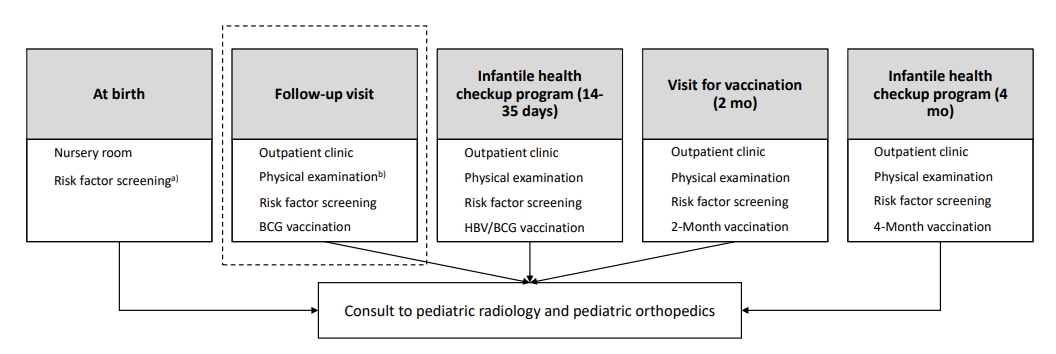
The risk factors and pathogenesis of developmental dysplasia of the hip (DDH) are unclear. Moreover, no universal screening method can entirely eliminate the risk of DDH. However, its incidence is significant and its early detection is critical for improving patient prognosis. Although the ideal evaluation time and risk factors, especially for premature infants, are unclear, the necessity for DDH screening programs for term and preterm infants is emerging.
- Nutrition
- Human milk oligosaccharides as immunonutrition key in early life
- Jung Ok Shim
- Clin Exp Pediatr. 2022;65(7):344-345. Published online May 3, 2022
-
· Human milk is a major source of immunonutrients for neonates and infants. Human milk oligosaccharides (HMOs) act as prebiotics and promote the growth of commensal bacteria.
· HMOs inhibit microorganism adhesion to the gut mucosa through interactions with the commensal microbiome and improve gut barrier function by increasing short-chain fatty acid mediated by bifidobacteria and immunomodulation.
· Several randomized controlled trials recently reported on HMOs.
- Review Article
- Gastroenterology
- Clinical importance of immunonutrition in infants: a review of the recent literature
- Ji Sook Park
- Clin Exp Pediatr. 2022;65(7):337-343. Published online February 17, 2022
-

Nutrients are important in the developing immune system. Human milk supplies diverse bioactives to prevent acute infection or chronic inflammation. Immunoglobulins, lactoferrin, and glutamine in human milk decrease gastrointestinal and respiratory infection. Human milk oligosaccharides promote the growth of intestinal microbiota, the gut barrier, and antimicrobial or antiviral activity. Micronutrients act as anti-inflammatory immunonutrients, too. However, the toxicity of some nutrients from an overdose should be considered.
-

-
-

-

-
Impact Factor3.2
-
8.02023CiteScore94nd percentilePowered by







